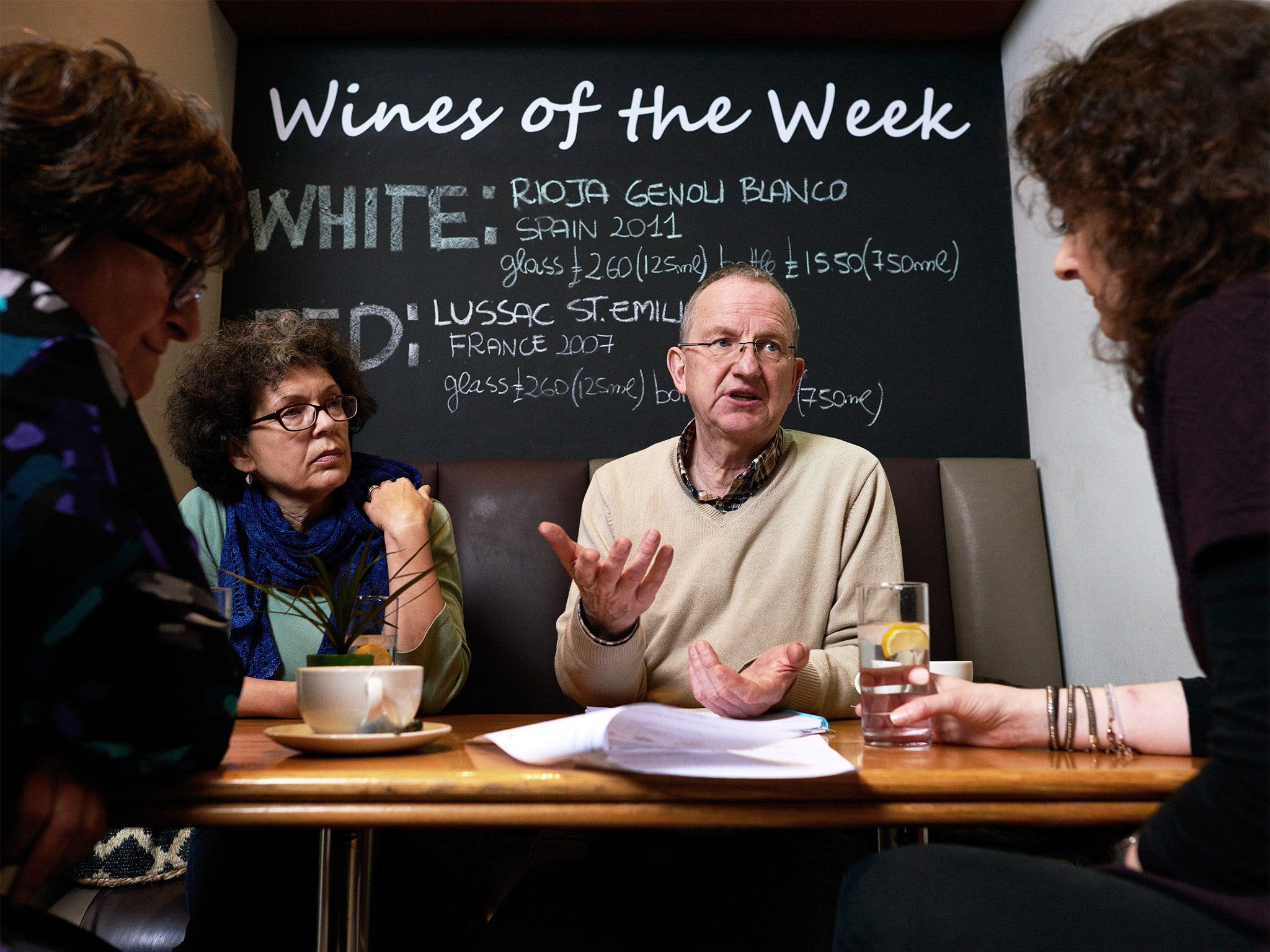Life, the Universe and Everything: Dr Morris's alternative science class for 'the curious adult'
A former A-level teacher has captured the imaginations of adults by looking afresh at the way scientific principles are taught. Now he believes the same methods could be used in our schools

Anna Wojtowicz has just started an animated group discussion by asking "What exactly is energy?" With her fellow students, she brainstorms possible answers, while their teacher, Dr Andrew Morris, almost surreptitiously nudges them towards the scientific principles, which the students then go off and investigate. For Anna and her classmates, their regular science lesson offers a chance to cast a critical eye on the aspects of the world that they're curious about. Fracking, climate change, medicine, even the latest claims from Cern about the Large Hadron Collider, come under scrutiny.
But Anna and her class aren't your average students. They are all adults ranging from their late 20s to mid-60s – Anna is 51 – and when they left school, science was the last thing they ever wanted to pursue.
It appears that the way science is taught in schools hasn't changed much over the past four decades. Most of this group barely scraped a pass at biology, chemistry or physics under the old O-levels, or later under GSCEs. Even the one or two who did moderately well say that they can't recall much, if anything – and nothing relevant to their everyday lives.
Nanya Kumari, 45, who has a good retentive memory, says: "I was rubbish at school science. I still remember all the knowledge – Archimedes' Principle, Fleming's left-hand rule – but I have no idea why I need it."
All that changed in 2002, however, when former A-level teacher Dr Morris tore up the curriculum and launched an alternative science class for "the curious adult" at the Mary Ward Centre in London. The six-week adult education course, "Life, the Universe and Everything", so captured the imaginations of people such as Ann and Nanya, that they demanded the discussions be continued beyond the life of the course. So Dr Morris reconvened the groups in a local wine bar – gatherings that continue to run to this day – with many of the original students still attending.
Discussions start not from the science itself but a shared curiosity: "Why are clouds white and the sky blue?" "Why are blondes overwhelmingly blue-eyed?" "How do vaccines work?" Why is there no drug for asthma?" Gone were the defined boundaries of biology, chemistry and physics; out, too, was the all-too-often alienating complex mathematics – unless the students chose to pursue it. They all agree that school curriculum designers would do well to pursue this line and some pretty influential bodies agree with them.
The Royal Institution has invited Dr Morris to present evidence from the research he has amassed over the past 12 years, much of which is highlighted in his new book: Getting to Grips with Science: A Fresh Approach for the Curious. His contention is not that the content of science should be ditched, but that specialisation should be delayed and "science for all" should be taught "not in the traditional way that has grown since the Enlightenment but as one of the humanities".
Dr Morris was a leading scientist before entering education. With a doctorate in bio-physics and experience as an X-ray crystallographer, he has an almost unrivalled view of what works in science education according to many people, including the former Education Secretary Baroness Morris, with whom he has worked and advised through the York University-based Coalition for Evidence-Based Education. He is chair of several national education research organisations, including the Education Media Centre, which he helped to create.
And yet even he felt that his experience of school science was lacking. He loved primary school, which mixed science and humanities, but specialisation began to bite in secondary school, as training for university displaced the joy of enquiry. "I felt upset that a choice had to be made between arts and the sciences," he says. He felt equally constrained as an A-level teacher and quit the job, but as he rose in management to become a director of City and Islington College, he never wanted to lose touch with the classroom and therefore created the Mary Ward course.
Monica Lanyado , 65, another of his students, who has been going to Dr Morris's classes for eight years, shares his view. A former maths teacher, she did A-level physics in the sixth form which, she says "left me cold; I could not understand it." Now she is getting to grips with quantum mechanics and will return again and again in order to understand it without feeling cowed.
"What I have gained is an understanding of the interconnectedness of everything around us – the physics, the chemistry, the biology, the history. It nurtures the inquiring mind and leads to a better understanding."

Another student commented on the appeal of the non-systematic approach. "I love jumping around, like when we discovered the various hormones or the elements of the periodic table. In the end, it all fits together, life is like that. You always end up with more questions than you ask." Nanya makes a similar comment: "For me, it was like islands of knowledge coming together to form a land that I could stand on and from which I could see relationships between things more clearly."
Dr Morris's arguments in favour of radical reform of school science are supported by other research and evidence from the learned societies, ranging from the National Foundation for Educational Research to the Institute of Physics (IoP). Far from supporting the current elitist, vocational, university-driven approach, the authors of a 2006 paper for the IoP, Girls in the Physics Classroom, said: "Studies that have examined pedagogic strategies that increase students' motivation and enjoyment of science have found that the students give value to approaches that are typical of teaching and learning in a humanistic science curriculum."
In his book, Dr Morris expresses repeated frustration over the lack of action in the light of evidence. He writes: "The researchers say radical things about how wrong science in schools is but they don't get anywhere. How do they relate to measures to bring about change in science education?"
Dr Morris's book moves beyond criticism, focusing on current developments in science education that, he insists, need applying more widely, and offering a map and ideas towards a better curriculum for all ages. "The upper-school syllabus is organised to suit the needs of those who will go on to study science, medicine or engineering," he says. "These have done very well on the whole, but what about the majority who need scientific literacy?"
The decade in which Dr Morris has developed his work has seen an explosion of new opportunities to satisfy a lay audience of adults interested in science, often for the first time in their lives. They include the Science Museum's Lates series, a free weekly education night which Dr Morris's students regularly attend, spanning every topic from how lasers work to the science of sex, alcohol and climate change. Similarly, The School of Life in London offers classes in a range of scientific topics including neuroplasticity and nutrition.
Morris believes that the current approach to science in school is outmoded. He writes: "Rigid syllabuses, using 19th-century concepts of knowledge, coupled with equally archaic notions of instruction, send young people running in the direction of English, history, geography and the arts when faced with narrowing choices at 16. My contention is that it is the nature of what counts as science in education, and the manner in which it is communicated, that are the root of the problem."
'Getting to Grips with Science: A Fresh Approach for the Curious', by Andrew Morris is published by Imperial College Press
Join our commenting forum
Join thought-provoking conversations, follow other Independent readers and see their replies
Comments